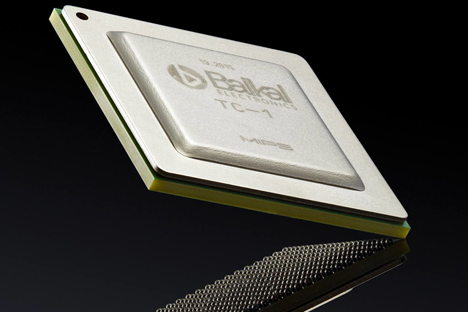Russian microprocessors to debut on global markets

The Baikal T-1 is the first Russian-made chip for commercial use.
Press photoThe Russian company Baikal Electronics (BE) plans to start production of the first commercial batch of its Baikal-T1 dual-core microprocessors. About 100,000 chips will come off the production line in early 2016. According to BE, more than 100 companies are among the first customers, and about 20 are outside of Russia. These include Lanner, the Taiwanese manufacturer of embedded computers. By 2020, BE plans to sell at least 5 million chips at home and abroad.
The Baikal T-1 is the first Russian-made chip for commercial use, and will cost about $60. Until recently, Russian companies made microprocessors mainly for the country's defense industry.
According to BE representative, Andrey Malafeev, $60 per chip corresponds to market prices for a complete system with an interface that performs all the functions of a computer.
Competitors to Baikal T-1 include the American companies Broadcom and Freescale, said Valery Shunkov, head of the Fifth Generation Microelectronics Experimental Design Bureau. They make chips specifically designed for routers, routing gateways, digital TV set-top boxes, and home appliances, and their cost is in the range of $50-$70.
Gleb Mishin, general director of Lenovo in Russia, CIS and Eastern Europe, said it makes sense to make equipment based on BE microprocessors if the Russian government requires the use of a Russian-made microprocessor. However, at the moment there is no such obligation.
BE plans to release four types of microprocessors, one of which has been designed for personal computers. According to Mr. Mishin, Lenovo devices can be adapted to utilize them, but the company will do this only if the price is competitive, or if there will be sufficient demand from Russian state-owned companies.
First published in Russian in RBC Daily.
All rights reserved by Rossiyskaya Gazeta.
Subscribe
to our newsletter!
Get the week's best stories straight to your inbox
